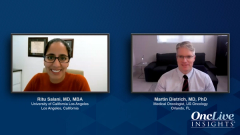
HER2 ADCs in Cervical Cancer: A Promising Therapeutic Frontier
Ritu Salani, MD, highlights impactful findings from the DESTINY-PanTumor02 study in patients with cervical cancer, highlighting the promising role of HER2-directed ADCS in this treatment space.
Episodes in this series

Dr. Ritu Salani discusses the potential impact of the DESTINY-PanTumor02 trial on the treatment of cervical cancer, highlighting the promising results and the challenges that remain.
Cervical cancer has been a challenging area, and while immunotherapy has revolutionized front-line therapy for advanced and recurrent cases, there is still a significant need for effective second-line therapies. Tisotumab vedotin, another ADC, recently showed a positive advantage over chemotherapy in a phase 3 trial and is likely to become a second standard therapy.
In the DESTINY-PanTumor02 trial, HER2-positive cervical cancer patients had a 50% response rate, which increased to 75% in those with IHC 3+ expression. These response rates are substantially higher than the typical 6-7% seen with chemotherapy, making this a potentially game-changing development. However, the challenge lies in identifying the small proportion of cervical cancer patients who express HER2, which is likely to be in the single digits.
The progression-free survival data was also notable, with the median not being reached in the IHC 3+ group and a median of 4.8 months in the IHC 2+ group. While the DESTINY-PanTumor02 results have been incorporated into the NCCN guidelines for cervical cancer, Dr. Salani emphasizes the need for careful patient selection when using this therapy.
With two ADCs now available (trastuzumab deruxtecan and tisotumab vedotin), Dr. Salani believes that both will be important for HER2-expressing patients but cautions against using trastuzumab deruxtecan in all-comers just yet. She also expresses excitement about the potential for combining ADCs with immunotherapy to further exploit these targets.
Summary generated by Claude AI





































